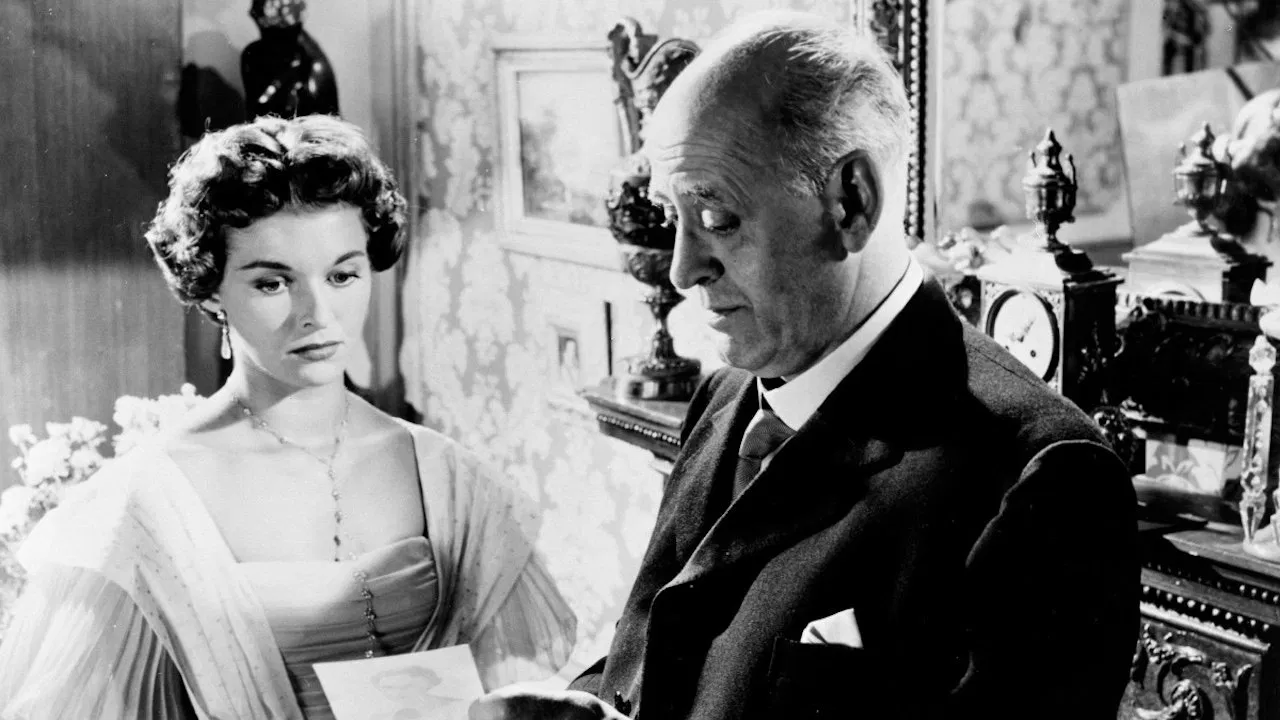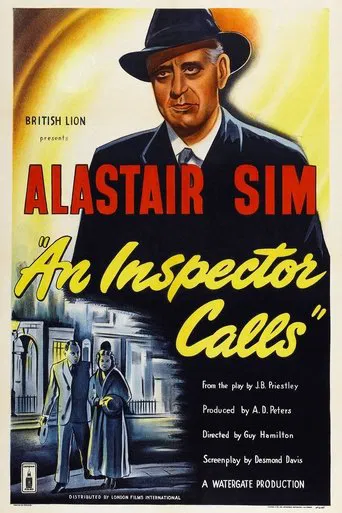

J.B.Priestley's most famous play is an ingenious composition of knots tied up into an overwhelming mess of guilt and human weakness with many hard lessons learned on the way, until it all dissolves into a trifle, but then the real serious business begins, which we may know nothing about but are left to guess wildly at the consequences...The play-acting is fantastic all the way including the minutest details, like for instance the small girl in the fish and chips shop stating her order exactly before wiping her nose. Alastair Sim is always eerily fascinating with his microcosmic acting where the smallest hints import the greatest significance, and Bryan Forbes, quite young here still, excels in a very variegated display of different sides of a spoiled rake, a mother's boy in the worst sense of the word, but comes out of it alive and perhaps better than the others. This is a dream play for any director, who is bound to have a very good time with it including the actors, and the elegance, the comfortable environment with sofas and boudoirs, also including the smoky theatre bar, adds to the charm and entertainment. This is a theatre classic perfectly transformed into cinema with flashbacks and poignant camera and music effects that must charm anyone at any time. It is all set in 1910-12, but it definitely strikes the timeless zone at once and keeps it there, underscored by what we never shall know will happen next...
... View MoreA toff English family dinner is interrupted by the appearance of Inspector Poole, he announces that a young lady has committed suicide by the ingestion of disinfectant. At first the family is oblivious as to why this concerns them, but as Poole interviews each family member, it's apparent that one thing binds them all to the mystery.Adapted from the J.B. Priestley stage play, An Inspector Calls is everything that was great about 50s British Cinema. Simple in structure it may be, but the lack of clogging in any form shines brighter than many a lavish production from this particular decade. The films cause is helped immensely by the quality of the writing, Desmond Davis adding further quality to the already great source provided by the talented Priestley. At first the film leads you to believe that it's going to be a one room interrogation piece, but thru a series of flash backs we are taken out of the room to follow this intriguing story to its quite brilliant finale. There are no histrionics from the actors in this piece, all of them are wonderful because they adhere to the necessity of letting the story be the star. Alastair Sim is perfectly cast as Inspector Poole, a large presence with those highly sympathetic eyes, Sim may be playing the main character, yet he's playing second fiddle to the fleshing out of the Birling family deconstruction, it's a wonderful case where the acting glue is holding it all together.Director Guy Hamilton does a smashing job of making the film permanently edgy, a sense of unease is palpable throughout, and it's only during the final reel that the heart of the film shows its ace card, and even then, the makers have one more trick up their sleeves. Also worth mentioning is the editing from the sadly uncredited Geoffrey Botterill, so many films containing flash back sequences feel intrusive to the flow of a picture, it isn't here, it's spot on. An Inspector Calls is a wonderful mystery piece that is dotted with moments of unease, but all this would go to waste if the pay off was merely a damp squib, it thankfully isn't, and the likes of Rod Serling and Charles Beaumont were surely nodding in approval.Highly recommended 9/10.*Footnote:Alastair Sim is listed on this site as playing Inspector Goole, that is the characters name in the Priestley play, but i can assure everyone that his characters name is definitely Inspector Poole for this film version.
... View MoreI have an excellent copy of this rare and wonderful film and Alastair Sim introduces himself -distinctly- as Inspector Poole, the daughter's fiancé asks a police officer about the Inspector using that name and the police officer repeats the name. Goole is a rather gruesome reference to ghoul, I think, and the benevolent Inspector was not at all depicted as a creepy or menacing man. J.B. Priestley meant this piece to be as much a morality play as a mystery, I believe. The Inspector was supposed to be either an angel on a mission or God himself giving these unconscious people a chance to redeem themselves for their thoughtless and compassionless actions... The performances are uniformly top notch and Alastair Sim's, in particular, rivals his unsurpassed portrayal of Scrooge in the finest version of "A Christmas Carol." I highly recommend this film as a first class lesson in the common foibles of human nature and how we have the ability to achieve salvation if we take responsibility for our faults.
... View MoreThis was a nice surprise when I saw it in 1977 or so. Alistair Sim had appeared as Inspector Cockerill in GREEN FOR DANGER shortly after World War II, and gave one of his best performances as that droll Scotland Yarder, who just manages to bungle his successful investigation at the conclusion of that film. Here he finally repeated the role of an inspector of the police - Inspecter Goole, who disturbs a pleasant evening at the Birling mansion in some midland industrial town with news that there has been a tragedy involving the death of a young woman, and she seems to be connected to the family.J. B. Priestly was a highly successful novelist and dramatist of the middle years of the 20th Century. Besides AN INSPECTOR CALLS, he wrote LAST HOLIDAY and the novel (later a television series) LOST EMPIRES. He usually sets his stories (not LAST HOLIDAY) in the Edwardian period. That is the setting of LOST EMPIRES, which follows the London Music Halls in the years before and during World War I, and in this film, set in 1912. As it is set in 1912 it is like Terrance Rattigan's THE SLEEPING PRINCE (filmed as THE PRINCE AND THE SHOWGIRL) - a story whose plot line is complicated by the knowledge of the audience that history is headed in a disaster of war that will destroy the world of the characters.They are quite complacent these Birlings. The father is an industrialist, who has become Lord Mayor of the city. A bluff old codger, he thinks that most of the problems of the world can be covered over by a smile and some cash. His alcoholic son and his daughter and her fiancé seem less cynical, and his wife seems more proper. But each is forced to look at a photograph of the dead girl, shown by the Inspector and suddenly see their sins of pride, lust, cruelty all arising. But in the end when about to admit they did wrong they learn that the Inspector may not be what he said he was. But the conclusion leaves them facing the same crisis that Goole seemed to be on the edge of resolving - and Goole is no longer there to advise them on how to solve it.Sim, with minimal effort, controlled the film although he was off the screen most of the time. His Goole is a pleasant enough figure - apparently just doing his duty - and not being hard on the Birlings. He is just letting their consciences act out their feelings of contrition. But in the end the contrition (for the older Birlings) was too weak. So something stronger was needed to make them aware of their sins.
... View More